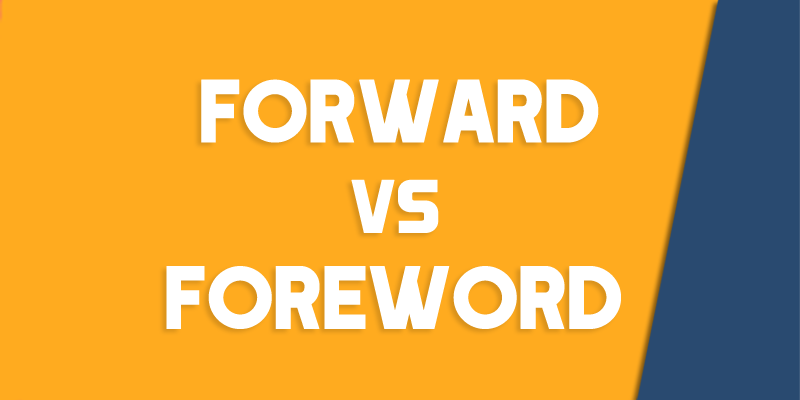Foreword vs. Forward – What’s the Gist?
Both of these words point to something directional. What makes them different is that one is stationary, and the other word has movement.
Foreword is a noun that means introductory remarks of either a speaker or, more commonly, a writer, which helps the listening or reading audience get prepared for the major work that follows. The foreword is fixed spot found at the beginning of the work, making it stationary.
Forward, on the other hand, acts as a modifier suggesting being at the beginning or making progress; or move toward what is ahead. Forward shows progression, making it fluid.
- Foreword is always a noun.
- Forward is either an adjective, meaning advancement; or an adverb, suggesting onward momentum.

How to Use Foreword in a Sentence
Foreword definition: Since foreword is always a noun for the introductory remarks found in a book, it will be simple to remember.
For example:
- The author wrote a moving foreword for his new book. (Noun)
- In addition to the foreword, the book included a dedication page, an acknowledgment section, and background information in the preliminary pages. (Noun)
Foreword is a synonym for the word preface, which may be a more familiar term.
How to Use Forward in a Sentence
Forward definition: As an adjective, forward shows being near to the front, or it has a suggestion of readiness. Furthermore, as a substantive modifier, it has a negative connotation, meaning the lack of reserve or being brash.
For example:
- The company was making forward progress with its ad campaign. (Adjective)
- Her frank approach and brash manner were construed as being forward. (Adjective)
- The warriors moved slowly forward toward the frontline. (Adverb)
Forward acts as a modifier, as an adjective telling which one and as an adverb telling where.
Outside Examples of Foreword vs. Forward
- Actor Rainn Wilson invited Dwight Schrute to write the foreward [sic] to his memoir, “The Bassoon King: My Life in Art, Faith, and Idiocy,” and if you’re not in on the joke, you might think he made a big mistake. –Orange County Register
- The historic Palisades Amusement Park opened in 1898 and was a sprawling family entertainment center covering 30 acres in Cliffside Park and Fort Lee. “Anybody who has played, visited, or been touched by this magical kingdom retains the glow from a very special relationship,” wrote Cousin Bruce Morrow in a foreward [sic] to “Palisades Amusement Park: A Century of Fond Memories.” In addition to carnival rides, the park contained the world’s largest outdoor saltwater pool. –The Star Ledger
- “There is still tremendous fear that exists within the community,” Gonzales said. “That’s why we continue to move forward. At the end of the day, I really do believe that Coloradans believe in fairness and that Coloradans believe in justice.” –The Denver Post
- Bloomberg also suggests reining in high-speed trading, cracking down on payday lenders, and discouraging deals by the Justice Department with financial firms where they are fined but not prosecuted. The plan also addresses forward-looking regulatory questions around financial technology, including support for allowing startups more flexibility to experiment with new methods of providing services without facing penalties from regulators. –Politico
Phrases That Use Foreword and Forward
Because of the narrow definition of the word foreword, there are not any common phrases using the term. However, there are several phrases that use the word forward, including:
Looking forward: Anticipating something pleasant that is happening in the future.
- After planning their wedding for twelve months, the couple was looking forward to the special day.
Fast forward: Moving quickly through something.
- Bored looks from the students caused the teacher to fast forward through the banal instructions.
Put your best foot forward: To look or act in the finest way possible.
- Putting her best foot forward, the political candidate tried to persuade the audience that her policies were the best ones.
Moving forward: Trying to reposition after a personal challenge or setback in life.
- The widower tried to move forward after the death of his spouse by attending the activities at the senior center.
How to Remember These Words
Once you know that foreword is always a noun for the opening remarks found in a book, you’ll be able to keep it straight from the modifier forward.
One way to help you remember is the letter e in foreword corresponds with the letter e in stationery, which is paper, and books are made from paper. That being said, the mnemonic device may be more complicated that just remembering the noun itself.
Forward, on the other hand, is a bit more complicated. It functions as either an adjective, describing progress, being near to the forefront, lacking reserve, or as an adverb, describing something that is toward the head.
For example:
- In the foreword for his new book, the author revealed the lengthy researching process.
- His forward development encouraged the other athletes to work hard.
- The toddler’s forward manner caused the mother some consternation.
- Go forward 500 feet and turn left at the red barn.
Article Summary
Is foreword or forward correct? Think about the function in a sentence. If it is a noun, choose foreword; if it is modifier, pick forward. Chances are that you’ll want the word forward.
- Foreword is a noun.
- Forward is an adjective or adverb.
